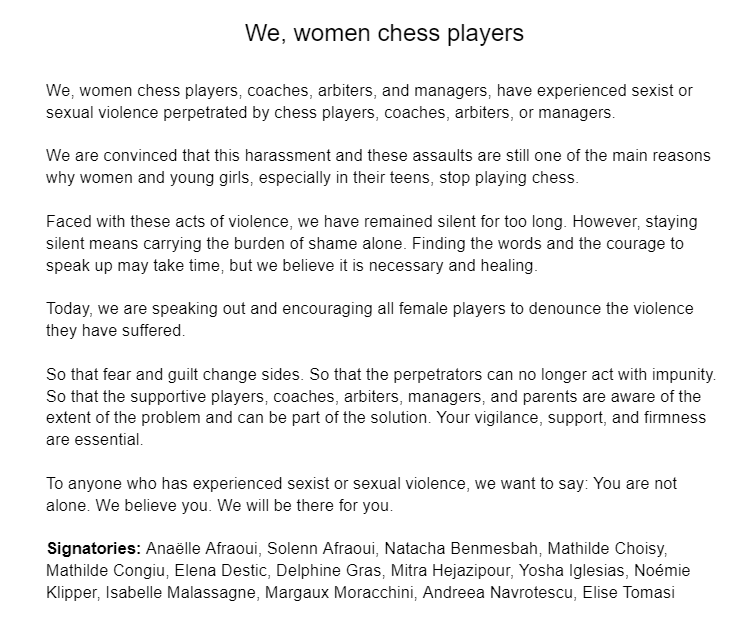International Chess Runs the Board on Misogyny
Sexual assault allegations and an ill-conceived trans policy put it in the spotlight.
Sabrina Chevanne’s tweets are chilling.
Story 1: She was 11, and went to a chess tournament with her father. Afterward, she posed for a picture with an English grandmaster. He smiled at her father’s camera, and grabbed her ass - or as she says, “arse.”
At the age of 15, she saw this grandmaster at another event. She had been on the cover of Chess Magazine, and he told her she was “developing nicely.” She thought he was talking about her game. Until he told her, essentially, that he had been masturbating to the magazine.
When she was 18, he sent her a message saying how happy he was she was “legal in all countries” and looked forward to spending “quality time” with her at the next tournament.
She pulled out of the tournament.
Story 2: A “world-renowned GM” offered her the use of his room at a tournament so she could get some sleep after an early morning flight. They had been friends, and she was grateful. He was not going to be there during the day anyway, he said. When she woke up, his hand was down her pants. When she tried to tell people what happened, they told her she was being dramatic. It’s not that other chess players didn’t know what he did, it’s that “he somehow had a way with people & everyone considered it to be normal.”
Story 3: When she was chosen to fill the only slot for women on the English national team, some in her country’s chess federation were outraged because she “didn’t look English,” presumably because she has darker skin. Her father was barred from coming in to watch her at some tournaments.
Story 4: OK, I can’t write story 4. Chevannes said on X that recalling the events to write her tweet made her throw up. Suffice it to say she was raped. By a friend. And her other friends were laughing about it the next day. All men. Or boys. During a tournament. When she had to concentrate on playing chess - for her team - but was in too much physical and mental pain.
We, Women Chess Players
Chevannes’ tweets came after an extraordinary open letter rocked the chess world earlier this month. The letter, from 14 female players, alleged rampant sexual harassment, assault and rape as the norm at tournaments around the world.
As of August 18, there are more than 100 signers, all with stories of their own. Stories much like Chevannes’.
This has been simmering under the surface of the chess world since February, when former U.S. women’s champion Jennifer Shahade asserted on social media that she had been sexually assaulted twice by U.S. grandmaster Alejandro Ramirez a decade ago. Ramirez is 34. He had been the second youngest man ever to reach the highest rank in chess.
Within days, “ten other women from the chess community reached out to Ms. Shahade to say they had also been assaulted or harassed by him,” according to the Wall Street Journal, which reviewed text messages by the women.
The Journal also confirmed through documents and interviews that Shahade’s “allegations, and [allegations by] others in recent years, were reported to top chess bodies, including the U.S. Chess Federation and the powerful St. Louis Chess Club, which failed to act or effectively investigate when first learning of them.”
Shahade’s brother also warned the St. Louis Chess Club, where Ramirez was employed, of his behavior.
Almost immediately after the Wall Street Journal story - but not the initial allegations - Ramirez announced he was resigning from the St. Louis Chess Club, and as the coach of the team at St. Louis University. He was banned by the U.S. Chess Federation. The second biggest online chess site - Lichess - announced it was cutting ties with both the St. Louis Club and U.S. Chess. Lichess frequently runs videos and analysis of games on its platform, as well as social media interviews.
“We do not trust that the current leadership of US Chess and STLCC can be relied on to protect women and girls in chess,” Lichess wrote in a scathing editorial announcing their decision.
More impactful, Chess.com - which live broadcasted many tournaments hosted by STLCC and U.S. Chess - has announced it is suspending its association with both organizations.
Ramirez’ lawyer suggested that he was the victim of changing mores.
Because you know… it used to be acceptable to assault women and girls. Just ask Brett Kavanaugh.
Everyday a Little Sting
In the last few weeks I have been gobsmacked by how many of the best women chess players in the world have been telling stories similar to Chevanne’s and Shahade’s.
But looking back on the times in my early adulthood when I tried to join chess clubs, only to find that they were all male and hostile to my presence, I wasn’t surprised.
I consoled myself with reading lots of books that had too much algebra. And, as technology took over, jumping into the online chess world in fits and starts.
If I’m being honest, though, there is a world in which Ramirez’ attorney, and Justice Kavanaugh, are correct. Up until a very short time ago, society looked at the behaviors these men are accused of as just the norm. Yes, they punished women who spoke up. But honestly, most of us didn’t speak up. We just moved on, found another road to go down, hoped to get to our destination.
I want to emphasize something that the women wrote in the open letter:
“We are convinced that this harassment and these assaults are still one of the main reasons why women and young girls, especially in their teens, stop playing chess.”
Still. Jesus Christ, my entire life is summed up in that one word.
Oh, but there is so much more
Earlier this week, not chastened enough by the accusations from women all over the world that some of the most powerful men in chess harassed and/or assaulted them, and that governing bodies knew and did nothing, the International Chess Federation (FIDE) announced a transgender policy that essentially says, “men are smarter than women, and therefore anyone who competed as a man and now identifies as a woman has a man’s superior brain and is not allowed to compete against women.”
Yes, I am paraphrasing. But I am not misinterpreting.
Transgender women cannot play in FIDE women’s tournaments. And trans men cannot retain any titles they won as women.
When I read about this in Erin Reed’s Substack (a must-read for all transgender legal/political news), it fit right into the stories I had been reading on sexual assault and misconduct in the chess world. All of these stories erase any doubt that sexism, racism and homo- and trans-phobia are part and parcel of the same abuse-of-power apparatus.
But the men in charge of international chess are clueless. As are - judging by the response to these stories on social media - many male chess players, whose tweets range from dismissive to violent.
Chevannes told London’s TimesRadio that “a lot of times, these men have not had attention from women outside of chess. They may not have been, necessarily, the most popular people in school… But suddenly, they’re amazing at chess and they’re at the top of their game… and they abuse that status and try to get as much as they can out of it and they just don’t know how to go about it.”
In other words, if these men weren’t good at chess, they’d probably be incels.
I’m Now a Queen
Trans women have had a bit of fun on social media with this latest international chess misstep. Especially fans and commenters interacting with each other on the page of Yosha Iglesias, a French trans woman who was one of the authors of the open letter.
“After I transitioned,” quipped KristiMiller30, “the first thing I noticed was the chess pieces got heavier.”
"My days as pawn are over, I’m now finally a queen,” wrote Luna van Yeethoven, riffing off the obvious point that the reward for a lowly pawn getting all the way across the board is to transition into the most powerful piece on the board - the only named woman in the game.
Joking aside, the reality is that men make up 85% of international chess tournament players, and no matter how many girls start to play chess, most of them quit in their teens - which Chevannes notes is because of the very sexual harassment that made her quit in her 30s.
“It’s a constant fear that, when you go to tournaments, you can never relax,” Chevannes told TimesRadio.
Chess is a mental game. Full stop. It takes tremendous patience and focus. But if one group of people are walking into tournaments looking over their shoulders, afraid of which chess official or grandmaster might hint at helping them with their career if they went back to their room, then they can’t give all their focus to the game.
So men have the advantage, because they are not constantly wondering who in the room is going to attack them next.
This is why the women-only tournaments were created in the first place - to give women safe places where they could gain competitive experience and stay in the game without fear of assault.
Of course, this isn’t only true in chess. A good man working in an environment full of sexual harassment can rise in his career by just keeping his head down. Even if he hates what’s going on around him. The women in the same environment don’t have that choice.
This is the worry for me. These two stories - about sexual assault and harassment, and about the ban on trans women using their “obvious exceptional testosterone-made brain power” to gain advantage over the cis women in their midst, are told as two different stories.
This is not just about chess. This is not just about trans women. This is not just about sexual harassment and assault. These are all stories about the perceived exceptionalism of men, and the perceived second-class status of women. They are about power. We need to tell these stories as different chapters in the whole story of misogyny.
Addendum
I should note that both the German and French federations have said they will not abide by the FIDE ban. In fact, Iglesias played in a French women’s tournament this weekend.
The U.S. Chess Federation also posted a trans policy update, in which they generally say they will allow trans people to play, but with a slightly American twist.
Their policy will “allow a person to identify as they choose, and allow each person one change to their gender identification. If an individual attempts a second change to gender identification, at that time the individual must provide US Chess a birth certificate, and the birth gender indicated on the birth certificate will be used to determine gender for US Chess purposes.”
Because, you know, in their minds, someone might change their gender identity to gain some sort of advantage.
Remember what I wrote back in May about people who understand nuance and people who don’t? This is how it plays out in, and harms, real people.






Just when I feel tempted to think that everyone has finally read the memo, it gets worse.
My (admittedly local) experience is quite contrary and the average chess player is way more gentleman than an average footballer here. Also consider, given the severe numerical imbalance male-female and how society is playing the "mating game" it's inevitable women get a LOT more attention, for better (special status & less competition) and for worse (harassment).